Camping with your children can be a lot of fun, and it’s a great way to spend quality time with your family. However, if it’s your first time camping with kids it can seem daunting. Fortunately, if you plan and prepare properly you can have a pleasant, low-stress adventure while teaching your kids about the magic of nature.
First, you should ask yourself if you and your family are ready for the challenge. If you’ve had a lot of experience with the outdoors, you might be comfortable enough to even take your infant or toddler. However, if you’re not experienced with the outdoors, it may be best to wait until they’re a bit older (5 years or older is a fairly common age)–but it’s never too early to start camping with kids.
Just remember if you’re bringing a very small kids camping, you’ll want to bring more comforts, such as a portable bassinet and/or a portable pack and play.
Contents
Do Some Practice Runs First

Before you commit to a full weekend (or even a full night) far away from home out in nature, it’s a good idea to get your kids acquainted with the outdoors before diving in. Pitch a tent in the backyard (or even inside your home) and let your kids get a feel for tent camping and let them adjust gradually. Get them each a comfortable sleeping bag (even better, let them each pick out their own sleeping bag to get them more involved in the process) and let them break them in so they know what to expect when you’re on your family camping adventure.
Another way to get your kids used to camping is to take a short day outing to a nearby park where you can set up your tent and let them feel what it’s like to be away from home in a more natural environment. This, especially when combined with backyard camping, can help your children get a feel for the real experience. Once they’ve decided they’re comfortable, you can move on to planning your first family camping trip!
Side Note: if your kids don’t seem to be warming up to sleeping in a tent, it may be a good idea to try renting a cabin to let them get familiar with staying out in nature. A cabin can offer a lot of comforts, so keep a that in mind as an option if your children aren’t warming up to the idea of staying in a tent just yet. Alternatively, another option could be RV camping.
Planning Your Camping Trip
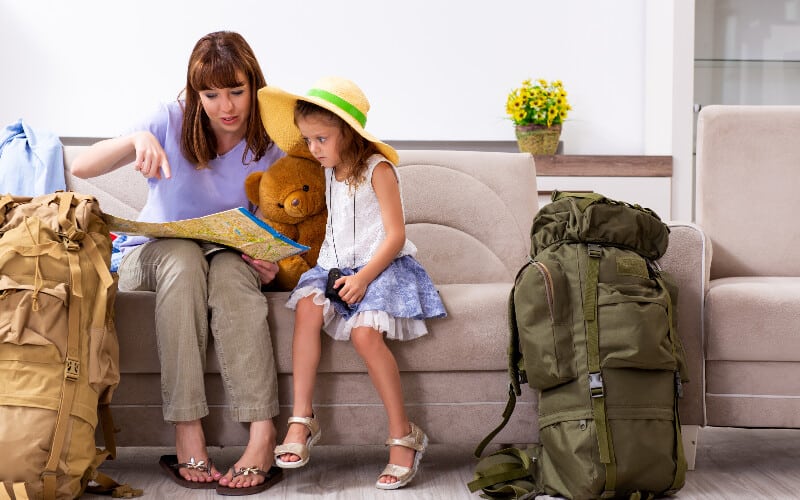
Before you head out, it’s important to take the time to properly plan. Families who take the time to plan ahead are the ones who get the most out of their time outdoors. Booking a campsite will give you a starting point for planning the trip and a range of options to consider.
Have your kids participate in the planning process; give them some ideas for potential campgrounds and have them help choose your destination to help build their excitement. If your kid loves the water, see if there are any campgrounds that have a lake, pond, or river nearby. If they enjoy a hike, choose an area with some trails to explore.
Keep it Simple
When you’re deciding where to camp, keep your options limited to well-kempt campgrounds for your first outings. Dispersed camping (roughing in the wild away from designated campgrounds) may sound exciting, but it can be a lot to put on younger children until they’re ready for more of a challenge. See if your potential campground choices have reviews online and keep an eye out for reviews that mention their family camping experiences.
Scope Out Your Chosen Campsite
If at all possible, make a quick trip to your chosen campsite before your trip to get a feel for the place. Make sure the campsite is well maintained and has a park ranger station or similar nearby in case of emergencies. Be on the lookout for nearby attractions (waterfalls, rivers, a nearby hiking trail, open fields, etc.) so you can have ideas about fun activities to partake in.
The more amenities your campsite has, the better. If possible, look for a campsite that offers flush toilets and community sinks or kitchens.
Packing Appropriately
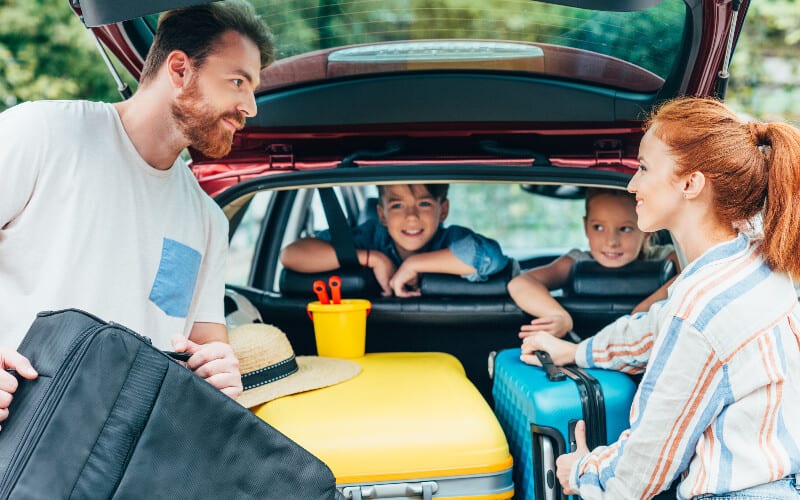
As the day of your camping trip draws near, start packing. Give yourself plenty of time so you aren’t rushing–the last thing you want to do is forget some important gear. Don’t overpack, but be careful to bring everything you and your family will need–and bring some extra clothes because they’ll probably come in handy as your kids have fun and wind up covered in dirt and mud.
If it’s going to be cold, jackets, long pants, blankets, hats, and gloves, and warm socks are all important things to pack.
Get your kids involved in the packing process. Show them what they need to bring and let them know why, and let them have some say in the clothes they pack to wear. Make sure that you’re prepared for all kinds of weather. Check the forecast and pack appropriate clothing–if there’s a chance of rain, bring plenty of raingear. If it might get cold, be sure to bring plenty of warm clothes to keep your children warm and comfortable. The right camping essentials will make your stay infinitely more enjoyable.
If you’re not sure whether or not you should bring something, bring it! It’s better to be over-prepared than underprepared. Make a camping checklist, and check it multiple times as you pack your camping gear.
Bring a Big Tent
Unless you’re camping with kids in an RV or going car camping, it’s a good idea to have your kids sleep in your tent with you, at least on your first few outings together. Staying out in the dark in the wilderness can be a very different experience, so it’s important that your kids know you’re there for them. Be prepared to snuggle with your children if they get nervous or feel uncomfortable. They will eventually learn to love the feeling of being out in nature, but it’s important not to rush it. If you have a big family, be sure to bring a big tent! Large tents can be expensive, but you can rent a great one at a low price.
If you have enough space, you might consider bringing an air mattress for your kids to sleep on. If an air mattress isn’t an option, consider a sleeping pad for each child instead. The more comfort you can add to your trip, the more enjoyable the experience will be for your little ones.
If you’re looking for the perfect tent, our Tent Buying Guide will show you what features to look for and consider before deciding.
Leave the Electronics
Your camping trip should be about enjoying nature, and it’s hard to ensure each child is an engaged camper when they’re glued to their screens. If possible, have your kids leave their electronics at home. If it’s not possible, make sure to set ground rules on when electronics can be out–and try to reinforce these rules to help your children get the most out of the trip.
First Aid Kit
The last thing you want on your family camping trip is an accident where someone gets injured. However, injuries happen–so it’s important to be prepared to act quickly. Having a first aid kit can help prevent injuries from becoming worse, and a fully-stocked kit is essential for every outdoor adventure.
Consult our First Aid Kit Guide to make sure you have all the essentials you need for your next outing.
Bug Spray
Insects can quickly ruin a fun outdoor experience, so it’s important you bring some insect repellent to prevent itchy bug bites. In addition to being an inconvenience, bug bites can also pose health risks. For a comprehensive guide on how to prevent and treat bites, read our How to Repel Insects guide before heading out.
Sunscreen
The harsh sun can also dampen your kids’ experience, so it’s important to keep strong sunscreen on hand during the daylight hours. Even if it’s overcast, the sun can be brutal and dangerous for children on a cloudy day.
Clean-Up & Sanitization Items
When it comes to kids, fun and messy go hand-in-hand. Bring along plenty of items to make cleanup as simple and painless as possible. Some good items to bring are: packs of baby wipes, child-safe antibacterial and antimicrobial wipes, and hand soap.
Bring Lots of Lighting
It’s not unusual for kids to be scared of the dark. Even if the dark doesn’t normally bother your kid, things are different when you’re out in the wilderness. One way to make the experience more comfortable is to make sure there’s a lot of lighting around your campsite and in your tent. Headlamps can come in handy, and putting glow sticks in water bottles can add some colorful illumination.
If you need some inspiration, our Campsite Lighting Ideas article should help get your creativity flowing.
Water, Water, and More Water
The last thing you want is to run out of water in the middle of your adventure. Your whole family will need to be fully hydrated throughout your entire adventure, and you’ll want to have enough water for sanitization purposes, such as dish washing and hand washing. On average you’ll want to bring enough water for an average-sized teen adult male to have 15 cups of drinking water per day, and for an average-sized teen or adult woman to have about 12 cups of water per day minimum. Kids aged 4 to 13 should have at least 8 cups minimum per day, and younger children such as toddlers need around 2-4 cups a day.
Multiply the number of recommended cups per person by the number of days you’ll be gone, then add them together to get the total minimum number of cups of water you need to bring with you. There are many ways to transport potable water with you, and you can check out our reviews of the Best Camping Water Containers.
Add an extra two or more gallons per day for washing hands and dishes if you don’t have access to a camp kitchen with running water, and be generous with your per-person water estimates–especially if you’re going to be partaking in more intense physical activities (such as going on a swim or a hike) on your getaway!
Setting Up Your Campsite
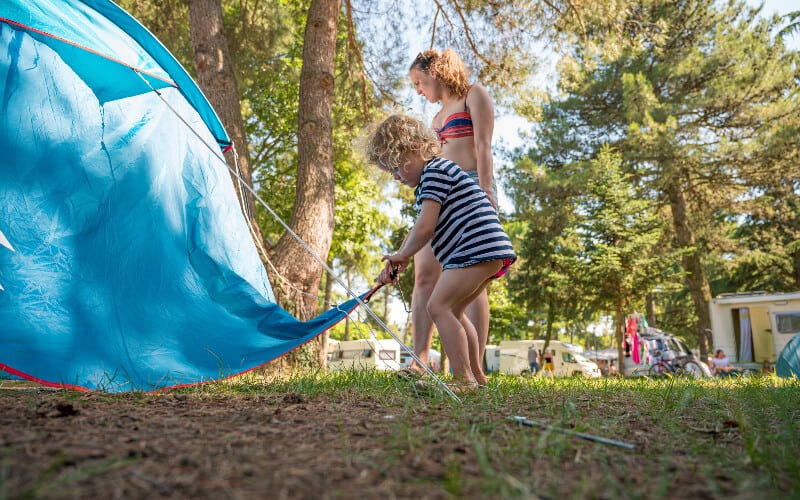
Picking the right spot to set up is crucial to having a good time. Arrive early so that you have plenty of daylight to get set up at a leisurely pace without getting stressed out or stressing out your kids. Have them help with the set up process by giving them some responsibilities so they can have a full camping experience.
Tent Location
Be sure to choose flat, level, dry ground to set up your tent on. Moist, marshy ground can soak through your tent, which can be extra unpleasant when camping with kids. If you’re going out on a damp weekend, make sure to bring and utilize waterproof flooring. Set up an appropriate distance from where your campfire will be (at least 15 feet, ideally 20+).
Fire Pit Location
Most campgrounds have designated pits or fire rings to build your fire in. Before building your fire, be sure you’re allowed to have a fire. Sometimes conditions in the area (severe droughts, etc.) can lead to fire restrictions. If you’re staying in a more backcountry location, check with local authorities to ensure you’re permitted to do so. If so, build your fire in an existing fire ring or build your pit away from bushes, low-hanging branches, and away from flammable materials (build on soil, gravel, sand, or clay). For more tips, check out our guide: How to Build the Perfect Campfire Every Time.
Picnic Table
If you have the option, try to set up camp near a table if possible. A table can add a touch of comfort and can make eating meals easier for the whole family.
Having Fun on Your Trip
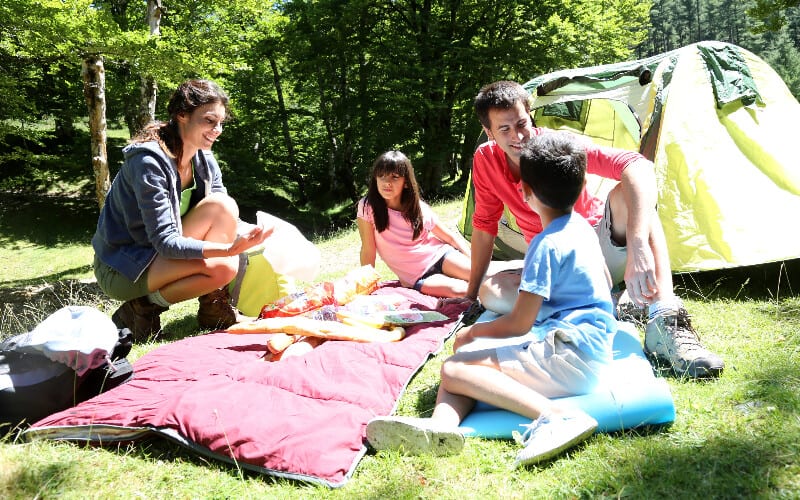
Kids have a lot of energy, and it’s important you have some activities planned out to help keep them entertained and prevent restlessness from setting in. Fortunately, the outdoors offers countless opportunities for excitement, you just need to be creative!
The activities you choose can be swayed by the attractions and amenities available nearby. If there are hiking trails nearby, a few hour hike with your family can be a great way to spend an afternoon. If you’re going to be camping with kids near water, bring some swim suits and enjoy!
No matter what camping activity you choose at any time during your stay, it’s important you choose activities that your children enjoy. If biking is a favorite past time for your kids, consider brining along your bikes if there are some safe trails nearby. Some campgrounds even have swimming pool access! If your kids prefer a different outdoor activity, plan accordingly and bring the right equipment. Some common activities include:
Scavenger Hunt
Hiding toys and treats around can help create excitement and get your kids more involved during your adventure. If you have older kids, enlist their help to hide the treasures around camp while you distract your younger children, then turn them loose on a treat-filled adventure! Just be sure you make a note of all the goodies you’ve hidden so you don’t accidentally leave any behind (as part of the leave no trace principle).
Geocaching
While you should limit your children’s access to electronics, you may want to make an exception for a geocaching adventure. If you’re not familiar with geocaching, it’s like a high-tech treasure hunt where your GPS can take you on an adventure around your campground.
If you plan on geocaching, be sure to bring some extra trinkets to swap with what you find to help keep the enjoyment going for the next campers who come along on a treasure hunt!
For more information, visit geocaching.com to learn how you can add this exciting activity to your kids camping experience.
Mini Golf
If your kids enjoy mini golf, consider brining along an outdoor kit if your camp is going to be near open fields or a park. These kits can be fairly inexpensive and can offer hours of enjoyment for the whole family.
Jumping Pillow
Some campgrounds may offer large inflatable trampolines that kids can jump on–if the campground you’re staying at happens to have one, be sure to take advantage of it. It’s a great way for your kid to have a blast, pass some time, and get worn out while you can relax.
Crafting & Coloring Books
You’re going to have downtime between your adventures and playtime, so it’s important to plan ways to keep your kids entertained while you relax. Coloring books and
Roasting Marshmallows
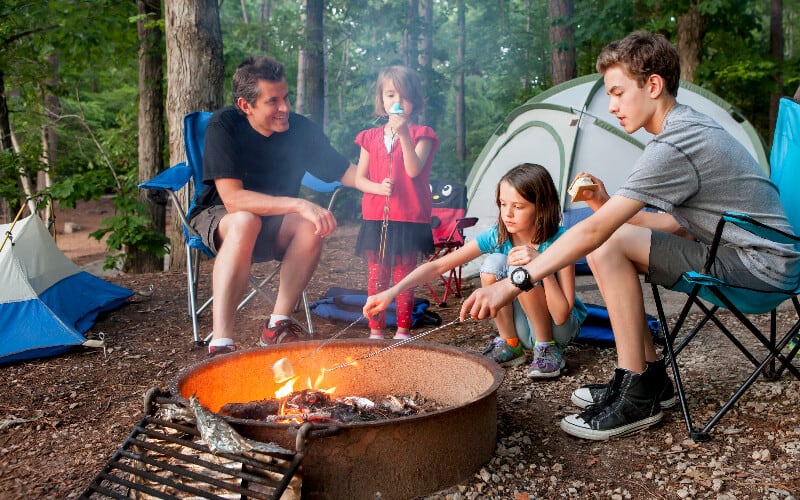
This is a great camping activity that young kids, older kids, and adults alike can enjoy! Simply bring some marshmallows, chocolate bars, and graham crackers and you have everything you need for a few relaxing hours around the campfire!
Stargazing
Learning about stars and constellations can be a great way for you and your children to unwind after a fun day. Bring a constellation guide and consider bringing a journal so your kids can sketch out the stars and make notes about what they see.
Just be sure to respect quiet hours so that nearby campers can get a good night’s sleep on their getaway.
Most Importantly: Have Fun
Remember: the main goal is to have fun! Allow your kids the freedom to explore and enjoy nature, just keep an eye on them to make sure they don’t wind up in danger or have any accidents that could be avoided–it can be tricky to find the right balance.
The above list is just to get the ideas flowing–if you’re looking for more ideas, skim over Our Camping Activities for Kids guide.
Camping Food
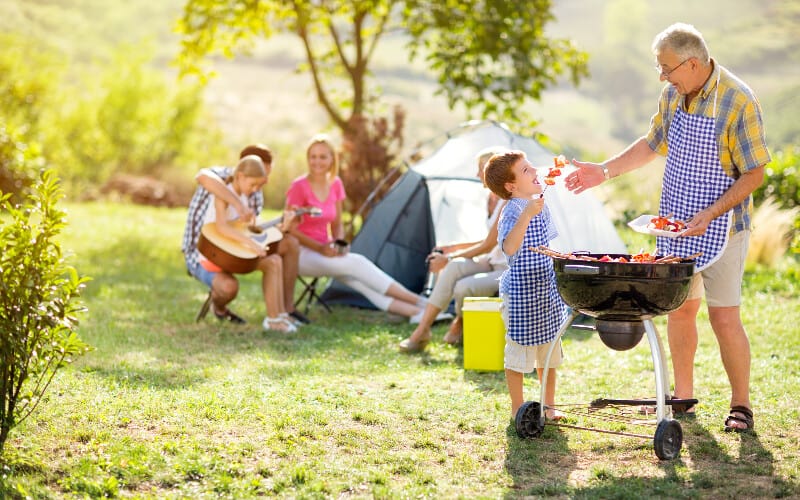
If your kids are picky eaters, planning meals can be daunting. It’s a good idea to stick with simple tried and true foods that you know you and your kids will enjoy. Be sure to be prepared with plenty of food, from snacks to hold everyone over between meals to healthy, energizing foods for breakfast, lunch and dinner.
Snacks for Kids
Bring lots of snacks for your kids to keep them full and happy between meals. Easy, low-mess hand foods are a smart and affordable bet. Apples, oranges, and other fruits are nutritious and delicious–just be sure to use wipes to clean any sugary residue to help avoid attracting insects. Dried fruits are also a healthy, easy, and satisfying snack–without as much of the mess!
Trail mix, granola bars, home-baked treats (cookies, brownies, etc.), and smores are all great options as well. Just be aware of how much trash these individually-wrapped treats can generate. Use any trash as a chance to teach your kids about leaving no trace by properly disposing of trash as quickly as possible. Doing so not only keeps the wilderness clean, but it can also help prevent attracting animals.
Camp Stove Meals
Cooking easy family favorites can be easy if you bring along a stove and a few pots and pans to cook with. From frying up sausage and scrambling eggs to browning potato wedges, frying fish, and so much more, a camping stove offers a world of opportunities to keep your family fed!
If you need some inspiration, take a look at our Best Camp Stove Recipes guide.
Dutch Oven Meals
A Dutch oven has been a favorite among campers for hundreds of years. You can cook everything from pancakes to cornbread, chili, soups, and more. Soups are a favorite among many children, so if you bring along some broth, noodles, and meat (such as chicken), you can whip up a meal the whole family will love with minimal effort. Just be sure to bring along a tripod to suspend your Dutch oven over your campfire!
For more tips and ideas, check out our Best Dutch Oven Camping Recipes!
Grilling
If your family enjoys hot dogs, sausages, or hamburgers, you can’t go wrong with grilling. If you bring along some tinfoil, you can even cook fish, vegetables, and all sorts of delicious foods. If your campsite doesn’t have grills on site, you might consider bringing along a small portable one. Alternatively, you may be able to set up a metal grill over your campfire!
For delicious grilled food ideas, head over to our Best Camp Grilling Recipes.
Cleaning Up & Heading Home
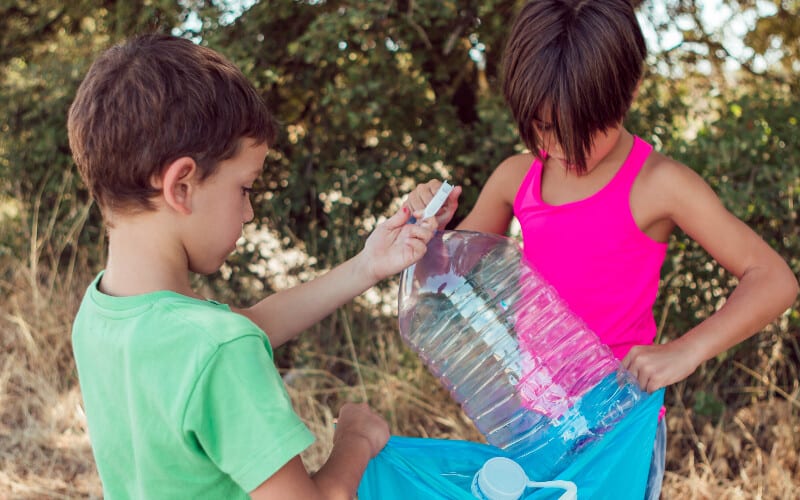
Hopefully your kids enjoy the outing enough to want to stay for the entire planned duration, but if a kid (or all of your kids) aren’t having as much fun as you anticipated, there’s no shame in wrapping up early. Taking your kids camping is an exciting and exhilarating experience, but it’s important that you’re in tune with their emotions to help foster their love for the outdoors.
By teaching your kids the “leave no trace” principle during your stay, not only will you reduce your chances of attracting the attention of nearby wildlife and insects, but you’ll also make it easier to do your final round of cleanup before heading home.
Help your kids patrol the grounds looking for any scraps of trash or leftover food that might not have made it into your garbage bags and collect them–you can even make it into a game to see who can find the most. Dispose of your garbage bags in any nearby dumpsters if the campground offers them. If not, pack them up in your vehicle to take home and dispose of.
Teach your children how to properly extinguish your fire with water, dirt, and/or sand, and teach them that not properly extinguishing your fire can be a threat to the surrounding wildlife.
Aside from cleaning up, get your whole family involved in the packing process. Show your kids how to properly disassemble your tent and have them help. The more they get to practice, the more you’ll foster their love of camping.
Conclusion
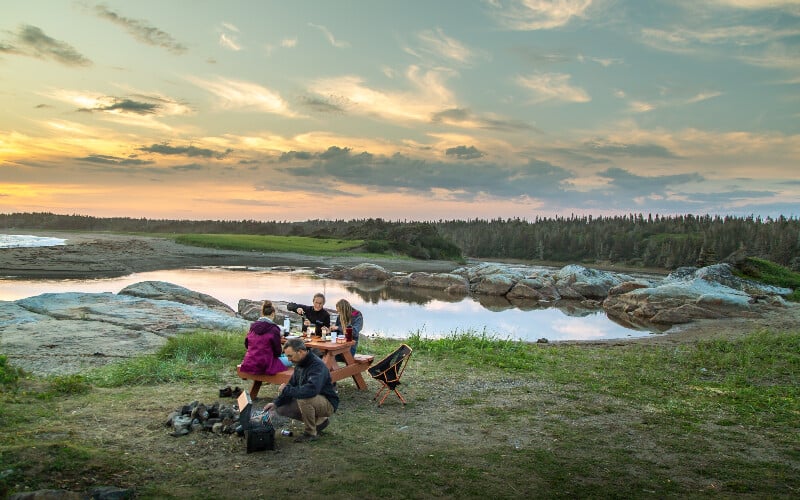
Spending time outdoors allows for a unique kind of bonding that can’t be experienced in other ways. By keeping your kids involved and planning fun activities to do with them, you can be sure your vacation is going to be a hit. Just be sure to pick the right campground and bring the right foods and your whole family will be ready to enjoy.
Also, don’t be afraid to bribe your kids with treats to help make your outdoor adventure go as smooth as possible. Little camping hacks can make the difference between a mediocre outing and an unforgettable experience!
If you follow these camping tips, you’ll have an experience the whole family will never forget!

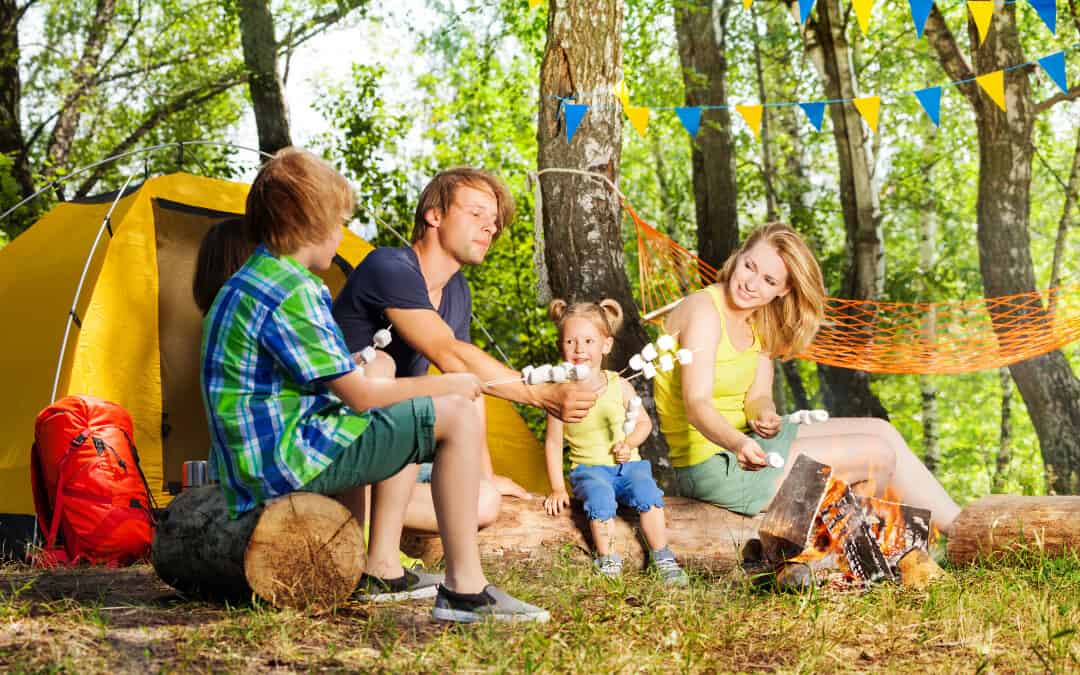
0 Comments